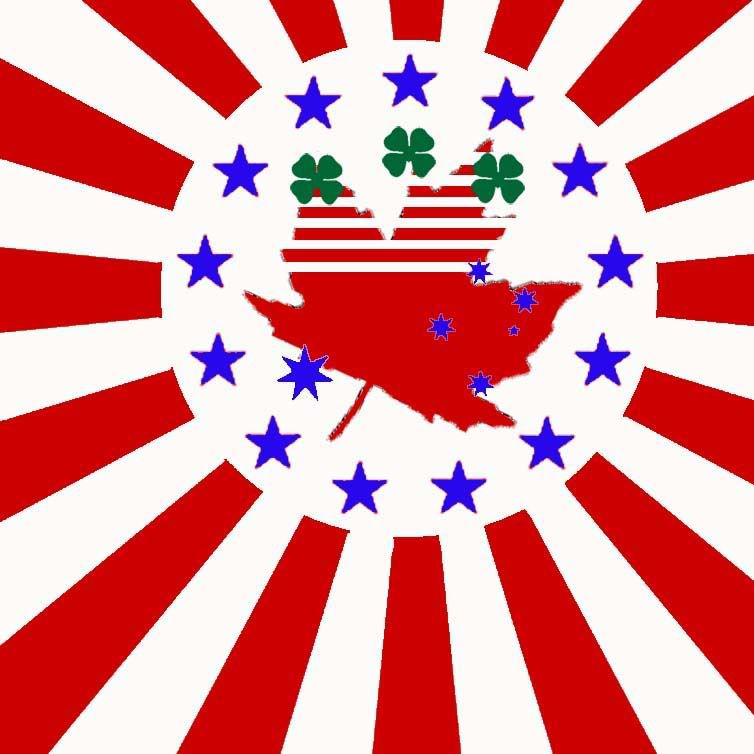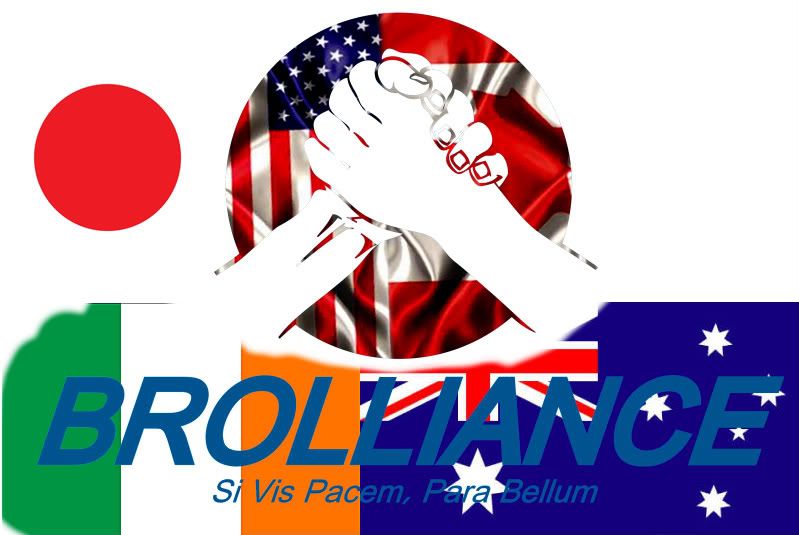Brolliance: A Cultural Analysis
 •
by
•
by Politius

Brolliance: A Cultural Analysis
May 2010
Origins
The Brolliance was originally a popularized term used to refer to the close bond between the United States and Canada. In light of the WW3 invasion of North America, this bond was further solidified by the Contract of the Brolliance: written by the whimsical yet patriotic Emerick—and signed by the then Presidents of both countries. The cohesion of the United States and Canada is widely accepted as one of the largest contributing factors to the resurgence and ultimate success of both nations in WW3. Many people mistakenly used to refer to the North Americans’ alliance as “Fortis”—after a few weeks and many comments and articles by U.S. and Canadian officials, it was eventually known that the original conception of Fortis, in the form of its contract, was void.
Fast forward to today, May 2010:
The United States has left the superalliance EDEN because of failed relations and American disillusionment of EDEN’s Eurocentric focus. The Brolliance has expanded to include Ireland, Japan, and Australia. Woxan was the President following PigInZen and the U.S.’s secession from EDEN. Woxan served one term as President (Harrison Richardson follows) and as such, he was the Party President of the Brolliance Party and was, perhaps, the de facto leader of the Bro international community. Woxan had this to say:
“The alliance [EDEN] focused on North America initially, but overtime the conflict became bottled into Europe, with Euro needs overtaking Asia, and Oceania. Do we, the Untited States, have a stake in Europe anymore?”
“Alliances should be regionally focused and small. They all have similar focuses, are geographically positioned to cooperate militarily, and can form economic unions.”
“Regional conflicts allow for stronger bonds between fewer countries, and allows nationalism to reign again.”
Find Woxan’s full article on the Brolliance here
Intro
The Brolliance can essentially be interpreted as an American bloc. Pres. Woxan stated that “The Brolliance is geographically centred on the United States, with the only exception of Australia who's a bit out on the fringe of the ocean. It has all 5 RMs between it's members, they share common goals, and are in a position to support each other militarily. It has superb relations and as a group can deal effective military strikes.”
Irish President patton had this to say:
"Ireland loves the Brolliance. The friendly atmosphere is just what Ireland needed to get out onto the world stage. I personally love how Brolliance is effecting Ireland. I think Ireland will be in Brolliance for the long haul "
Irish Presidential candidate in May, irishboy1967, had this to say:
"I often get asked what exactly the Brolliance is. Describing what the Brolliance is never seems easy. But something happened in my RL a few days ago.
On the eve of the CP elections my Brother left for Australia in RL, long-term, possibly for life. We grew up together, worked together, fought together. We were close. On his way to the airport he called to my house briefly to say goodbye. When I opened the door he just stood there, he didn't say anything and neither did I. We didn't need to. We just knew.
I think that pretty much sums up the Brolliance. It doesn't need words. It doesn't need a set of rules. We just know."

Humor
One exceedingly important yet, perhaps, easily overlooked aspect of the Brolliance is it’s inherit penchant for humor. The original contract drafted by the glib Emerick states its purposes as:
1. To cement for as long as possible the bromance between the countries of the United States (herein referred to as "the US"
😉and Canada, and lead to a meaningful, lasting and completely heterosexual relationship.
2. To prevent any man or woman from getting between our love.
The brilliant thing about the Brolliance is that doesn’t take itself too seriously—in respect to the fact that this is still a game—and meant to be fun. That’s not to say the alliance has less military or economic prowess—in fact, I believe it strengthens the Bros. Online joking subconsciously supports the notion that this is just a game—and thus suppresses eRepublik vices like cheating, hacking, and backstabbing.
Even the word “Brolliance” rolls off of the tongue humorously. The word is repeated so often that it reinforces the bond between the nations. You’ll (increasingly) often find “Pro-Bro” being said. The brotherhood is reflective of eRepublik’s majority male—and of that—majority 16-30 year-old demographics.
This is name is not without its criticisms. Naturally, it’s an endless fuel for trolls to jest at. No doubt this article will have its share of denouncements. Arguments claiming ‘Brolliance’ as a “stupid” name can be found here
Yet despite all the humor: the alliance is increasing its international legitimacy, interbro relations, and regional strength.
National Support
As of May, Brolliance support has manifested itself in the moderately large “Brolliance Party” (USA) and the “Brolliance Party Canada”—further evidence of growing international Bromance.
The Party President of “Brolliance Party Canada”, Tyler F Durden, ran for CP in May 2010 unsuccessfully—however, he received the second highest number of votes. Perhaps this was done by coincidence, and without purpose—but Tyler F Durden’s nomination was foremost “Brolliance Party Canada” and he was afterwards supported by other top 5 parties. So in this instance, the Brolliance trumped other national political institutions.
---
Real Life Influence
Interestingly—perhaps appropriately—in real life we can find distinct evidence of anti-Eurocentrism (particularly an Anglophobic sentiment) in all of these countries. Part of the growth of the Bros is their geographical and influential distance from European nations.
The American Revolution, well, speaks for itself.
The Irish have always particularly disliked Britons (think Protestantism and North Ireland)…yet in the same manner as Britons: they have historically been removed from the issues of Europe (Indeed, eIreland shares no borders with eEurope).
Canada, probably the most tolerant of Europe—is still particularly Anglophobic in the eastern region of Quebec. The Province of Quebec and its majority-Francophone population has had a long history of Anti-British sentiment since the conquest of New France by the United Kingdom in 1760.
In Australia: "Pommy" or "Pom" (probably derived from "pomegranate", rhyming slang for "immigrant"
😉is a common Australian slang word for the English, often combined with 'whing[e]ing' (complaining) to make the expression 'whingeing Pom' - an English immigrant who stereotypically complains about everything. Although the term is sometimes applied to British immigrants generally, it is usually applied specifically to the English, by both Australians and New Zealanders. From the 19th century onwards, there were feelings among established Australians that many immigrants from England were poorly skilled, unwanted by their home country, and unappreciative of the benefits of their new country.
In Japan: pre-20th century Japan saw widespread anti-Western sentiment. The Japanese were consistently wary of European colonization; which meant isolation from the West for decades. Yet, resisting colonization was ironically one of the main factors in their embracing of their own form of imperialism and modernization.
---

Harrison Richardson, the May President of the United States, claims that the Brolliance shouldn’t be expanded. Indeed, the vision of the Brolliance was a geographically centered brotherhood that cut down on bureaucracy and unwieldy size. However: many citizens have pointed to great relations with Croatia and Greece as reason enough to expand the Bro’s companionship and influence. At the moment, it would appear as though the US has no intention of bringing in new members to the selective few. Accordingly, the Brolliance is intended by its proponents to be a far deeper bond than simple MPP’s.
The official Brolliance forum can be found at http://brolliance.org/index.php
Since leaving EDEN, relations have improved between the United States and former allies because of the successful takeover of HelloKitty. It’s not clear whether or not this will cause the Brolliance to have less appeal to citizens.
eCivilization Table of Contents
Please Vote and Subscribe!


Comments
OH YEAH!
pretty good article, though it has a bit of a Wikipedia feel.
Great article!
Voted and subbed.